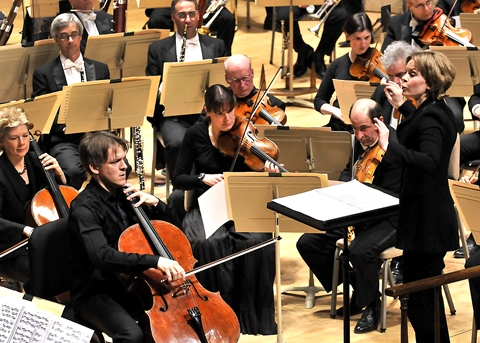
THUNDER AND LIGHTNING. Conductor Susanna Mälkki’s program with the BSO included the American premiere of composer Unsuk Chin’s Cello Concerto with Alban Gerhardt. |
Opera in Boston is now back in full swing. Boston Lyric Opera, with a company of singers and designers largely new to Boston led by Boston Classical Orchestra music director Steven Lipsitt, gave a memorable production of the opera that composer Viktor Ullmann and poet Petr Kien created in 1943 at the Terezín concentration camp, The Emperor of Atlantis, or Death Quits. Part savage satire (the dictator emperor's name is Überall - as in "Deutschland über alles"), part elegy, Atlantis is an oblique parable in which Death is so disgusted that he refuses to let anyone die. Underlying it all is the moving plea by these concentration-camp inmates to be relieved by Death of their suffering (which they soon would be, in 1944, at Auschwitz).Ullmann's eclectic score emerges especially from the syncopated sound world of Kurt Weill, with its ironic pop tunes, ballroom dances, and hymns, in edgy jazz-band orchestrations (including tenor sax and harmonium); one section is marked "Shimmy, ma non presto." Lipsitt and his chamber players brought it to vibrant life.
Stage director David Schweizer, imported from Glimmerglass Opera (which new BLO general director Esther Nelson left to come to Boston), set designer Caleb Wertenbaker, and costume designer Nancy Leary caught both the score's campy razzle-dazzle and its underlying melancholy. The production looked more like a circus than an opera, with the singers going up and down scaffolds and ladders, and the entire Calderwood Pavilion auditorium (in this the latest installment in BLO's Opera Annex series) draped with the plastic sheeting you find covering buildings under construction. If the music is something of a phantasmagoria, this production mirrored that quality.
The singers had strong voices and excellent English diction. Leading the cast was New York bass Kevin Burdette as Death. This guy really knows how to slither and prance and jump all over the stage; yet he was most poignant when, at the end, he lies down. His ringing voice was both vigorous and sonorous. His pal in the opera is Harlequin, and Canadian tenor John Mac Master teased us and goosed us and, for all his energized body language, never ran out of vocal breath. Baritone Andrew Wilkowske was the scary Emperor ("How can I rule if no one fears me?"), who ultimately agrees to be the first recipient of Death's final change of heart. Mezzo-soprano Jamie Van Eyck made an imposing and sinister Drummer, always leading a parade, even when no one was following. Tenor Julius Ahn and soprano Kathryn Skemp, the only two principal singers who had appeared previously with BLO, were touching as the boy and girl soldiers who find love as their answer to war.
The Emperor of Atlantis is too short to fill an entire evening. One can think of many good companion pieces (I'd pick Weill & Brecht's ravishing/harrowing Berlin Requiem). BLO took the noble route of commissioning a prologue from Harvard composer Richard Beaudoin: The After-Image, a 20-minute "tableau" about a woman (Van Eyck) who finds a photograph of her father (Burdette) when he was a young cadet. But neither the singers nor Schweizer's staging could bring it to a boil.